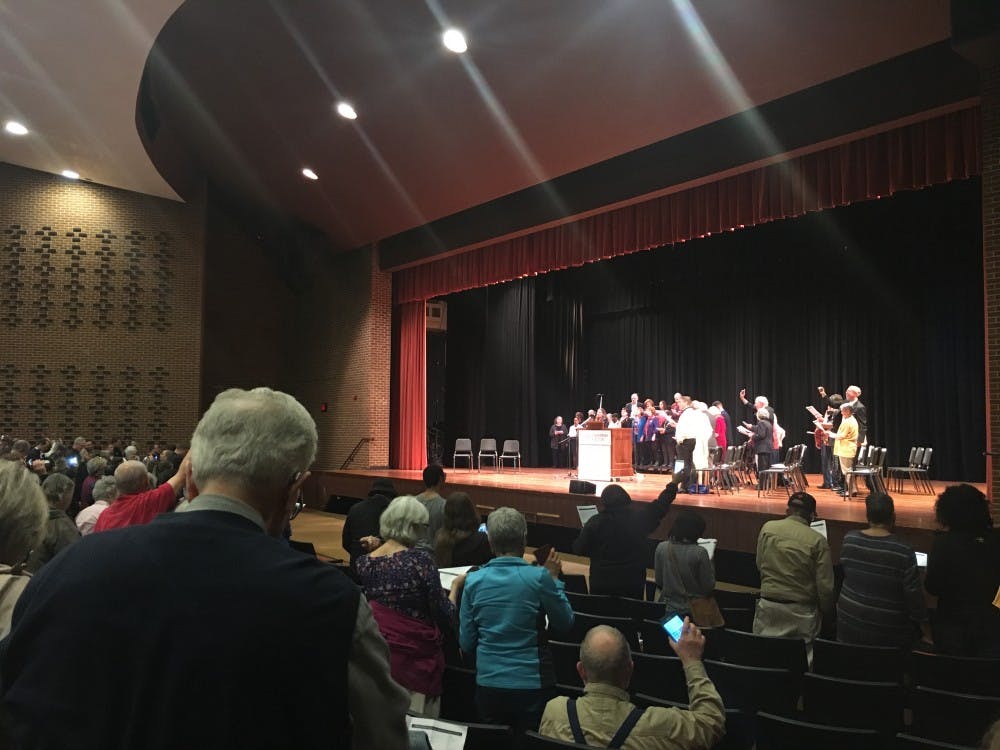More than 1,000 community members from 27 local congregations gathered at Charlottesville High School Tuesday night in an attempt to secure policy commitments from local government representatives on the issue of affordable housing.
The event was led and organized by IMPACT — Interfaith Movement Promoting Action by Congregations Together — a local grassroots organization which focuses on developing policy solutions for community problems. Since October, the group has focused specifically on affordable housing. The group has tackled issues such as transportation, women’s residential treatment and young adult unemployment.
“We’ve done dozens of meetings with anyone who knows anything about affordable housing,” IMPACT Co-President Daniel Xisto said, “and so today is kind of the day where we invite them, we let them know that we’re all showing up, we invite them onstage and then ask them in front of everyone if they’re willing to help us.”
In attendance at the event were members from the Albemarle County Board of Supervisors — Ann M. Mallek, Norman Dill and Ned Galloway — as well as Asst. City Manager Mike Murphy and Phil d’Oronzio, chairman of the City’s Housing Advisory Committee. The Housing Advisory Committee is a collection of advocacy groups and local stakeholders which advises the City Council on affordable housing issues. Members of IMPACT’s strategy team asked each individual representative for a commitment to the group’s relevant policy proposals.
“Recently, it was said that we are bullying by our process,” IMPACT Co-President Jamie Purhorodsky said. “We are not bullying … We’re using our power — the power of coming together and joining as one — to do good and help people in our community.”
Reverend Albert Connette of the Olivet Presbyterian Church read IMPACT’s policy demands for Charlottesville City, which were to streamline the approval process for affordable housing developments and review current zoning regulations to identify areas for reform.
“We want the city to make it a little easier for developers who are making affordable housing units to cut through some of the red tape that they have to go through right now,” Xisto said. Specifically, IMPACT asked that there be an under six-week process for approving site plans with at least 20 percent affordable housing.
On the issue of zoning, Connette asked for a review of current density regulations within the City.
“We want to see within six months a list of potential changes that can foster a growing stock of affordable housing units across all census tracts of the City, so that they can be incorporated into very important upcoming city plans,” Connette said.
Fifty-five percent of city land is currently zoned for single-family homes, thereby restricting opportunities for high-density affordable housing construction. Developments on West Main Street, one of the only areas still zoned for highly concentrated dwellings, have thus far largely been geared towards students rather than low-income tenants.
d’Oronzio and Murphy both expressed agreement with the requests, though Murphy asked that the Planning Commission also be involved in the zoning review process and slightly resisted the six-month timeline IMPACT proposed for the changes to occur.
“Six months is a little bit outside what the City is comfortable with,” Murphy said.
At the level of Albemarle County, IMPACT representatives asked for the drafting of an ordinance to create an affordable housing fund and a plan to build 150 housing units for low-income elderly residents over the next five years.
Albemarle County Board of Supervisors Ann M. Mallek, Norman Dill and Ned Galloway all agreed to the requests, though Mallek pointed out that the County is not technically able to draft an ordinance of that sort under current state law. Virginia is a “Dillon Rule” state, which means that municipalities can only pass ordinances on issues that the General Assembly grants them explicit power to regulate.
“We do not have the ability under state government to create the ordinance you desire, but we can find funds and we can earmark funds in our budget process,” Mallek said. “It’s definitely a spirited yes, but I can’t say yes to the words you’ve chosen.”
All public representatives agreed to attend the 13th annual IMPACT assembly on Oct. 30 and update community members on their progress.
The event also featured testimonials from Albemarle and Charlottesville residents who have suffered firsthand from high housing costs locally.
Denise Johnson, a member of Oak Union Baptist Church, recalled how her daughter received a government-subsidized Section 8 Housing Voucher to assist with her rent, but had to move to Northern Virginia because she couldn’t find anywhere to use it in Charlottesville.
“She had a good job at U.Va.,” said Johnson, “but now she struggles to find a job up there and has no support from me or the rest of our family.”
Since moving to Charlottesville in 2011, speaker Brenda Brown-Grooms said she has had to spend over 90 percent of her income on housing and at times faced the prospect of homelessness.
“Today I live in Albemarle County, I had to wait two years for my housing and I pay 76 percent of my income,” Brown-Grooms said. “I share this with you because I am representative of the homeless community. We look like you, we act like you, we have the same aspirations you have, we just want a home to be safe and sound in. It’s what all human beings want. It is not too much to ask.”







